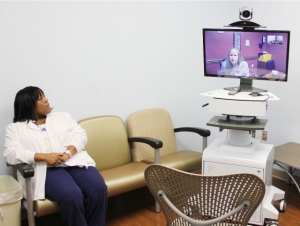Video chats helping mental patients at Wayne Memorial Hospital
By Matthew Whittle
Published in News on March 12, 2014 1:46 PM

News-Argus/MATTHEW WHITTLE
Rakishia Peterson, clinical operations supervisor for Wayne Memorial Hospital's emergency department, and Christy Harness, director of telepsychiatry services at Coastal Carolina Neuropsychiatric Center, on the screen, demonstrate how a telepsychiatry evaluation is done. The patient would sit in the chair.
Faced with a continuous backlog of mental health patients in its emergency department, Wayne Memorial Hospital is taking part in a new state effort to provide telepsychiatry services throughout eastern North Carolina.
Since the end of January, about 30 patients have been seen by the new program, but, says Denise Bruce, clinical director of the emergency department, its use is increasing.
Shirley Harkey, vice president of patient services, explained that the program is not revolutionary, but is relatively new.
"Telemedicine has been around for a long time," she said, giving the example of doctors being able to read digital X-rays from home. "Telemedicine is about putting the doctor and the patient together in a more unique and fast way. Telepsychiatry is a spinoff of that."
Essentially, she said, it's like having a Skype conversation between the patient and the doctor -- real-time and interactive.
"It's like they are in the same room," she said, explaining that the doctors are able to control the camera looking at the patients, panning around and zooming in and out.
But, she emphasized, the connection between the patient and the provider is on a secure and encrypted network designed to protect patient privacy, with changing IP addresses and the equipment under lock and key.
Furthermore, she continued, the room in which the exams are conducted is private and relatively nondescript.
The Statewide Telepsychiatry Program, which is run by East Carolina University's Center for Telepsychiatry and e-Behavioral Health, was inspired by successful model run by the Albermarle Hospital Foundation.
The need for it, is largely two-fold.
In many eastern North Carolina communities there are few, if any, available psychiatrists when a person arrives at the emergency department in some sort of mental distress.
But even in areas where those psychiatric services are available -- such as in Goldsboro and Wayne County -- the effects of the much-debated reforms to the state mental health system have placed a larger burden on community hospitals.
At Wayne Memorial, the emergency department sees approximately 60,000 people a year, and while only a small percentage of those may be in need of mental health services, those patients are a growing concern for the hospital.
Because the state system has largely divested itself of services to private providers, and because of a reduction in the overall number of beds in state psychiatric facilities, a simple math problem has appeared -- too many patients for too few spaces.
Mrs. Bruce explained that at Wayne Memorial, mental health patients under involuntary commitment orders have been known to stay in either one of four special holding rooms on the department floor, or in a regular room, for up to three weeks, waiting for space to open up at a provider.
Wayne Memorial's own psychiatric floor is only for voluntary patients.
So what the telepsychiatry program does, is give the emergency department doctors the ability to consult with actual psychiatrists -- in this case, from the Coastal Carolina Neuropsychiatric Center in Jacksonville -- in determining the mental health of the patient, and hopefully finding them services faster.
When a patient is brought in under involuntary commitment orders, the hospital's physician makes the initial call about what to do. Then, a telepsychiatry appointment is made. Often, it's within hours, or if a patient comes in overnight, the appointment is often scheduled for early the next morning.
At Wayne Memorial, Mrs. Bruce said, because of the high volume of patients, theirs are often seen first thing.
Then, once the patient is examined, the physician on duty can look at the psychiatrist's notes and discuss the case with him or her, before deciding what step to take next.
The advantage, Mrs. Bruce said, is that the psychiatrist may be able to recommend different medications or even that a patient may no longer need to be held -- and if he or she does, Coastal Carolina also helps find services, speeding up that process.
"Our doctors have really bought into it. It definitely has helped put my physicians' minds at ease," she said.
